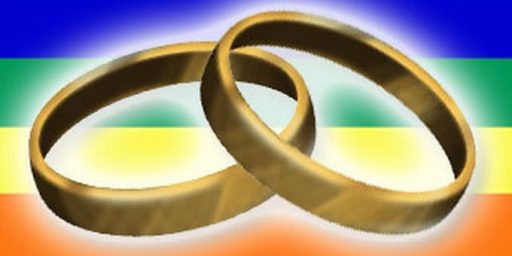WORDS MEAN THINGS
Matthew Yglesias is riding one of his favorite hobby horses the “use-mention distinction.” (See here for more on this concept.)
He quotes a Maggie Gallagher column (Usually that byline is enough to make me move along; how she got syndicated is beyond me. But I digress.):
What some dismiss as protecting “merely” the word marriage is actually 90 percent of the loaf. If a married couple no longer consists of a husband and wife, we lose the shared meaning of the word; we lose the ability to speak the idea in public and be understood. Such ideas are what culture is made of. Marriage is a word, yes, but so are property, freedom, democracy, morality, and love. The Ten Commandments are made of words. The opponents of marriage understand what many of its friends do not: Capturing the word is the key to deconstructing the institution.
Says Matthew,
No, no, and no. Marriage is not a word, “marriage” is a word. Similarly, “Plato” has five letters but no legs while Plato had no letters but two legs. Similarly with property, freedom, democracy, morality, and love, none of which are words. Rather, “property,” “freedom,” “democracy,” “morality,” and “love” are all words. This stuff is important, people, important.
I disagree with Gallagher that allowing gays to marry would harm heterosexual marriage. Indeed, it strikes me as silly.
But her point about words conveying shared meanings seems rather obvious. Right now, “married” brings the image of a husband (who is a man) and a wife (who is a woman) who have taken a vow to love, honor, etc. until death (or irreconcilable differences?) do them part. That meaning would be altered if “married” could mean two guys, two gals, or one of each. The cultural significance of “marriage” would indeed be altered. For those who are religious (I’m not one of them), much of the spiritual connotation would be altered as well.
If, for example, we call George Harrison a “hall of fame solo artist,” then we cheapen that phrase for all time, so that applying it to, say, Elvis Presley or Chuck Berry has less meaning. So, in a sense, the words we use to represent things matter.
Now, if Matthew simply means that Gallagher should have used single quotes (or alternatively italics) around the terms she was mentioning, then I’d say it’s a relatively minor, and pedantic, argument, since it’s pretty clear from the context that she’s referring to the words and their relationship to the ideas they connote. Indeed, I’d argue that putting quotation marks, around “merely” to emphasize it was at least as aggregious. But I’m not sure what style manual her syndicate ascribes to. These things are mere grammatical conventions; they don’t in and of themselves have meaning.






Interesting. To me, Gallagher really is trying to tie the concept of “marriage” to a specific relationship exclusive to a man and a woman – i.e. spinning the definition. It’s really of little value to us all to merely point out that all the marriages in the past have been between a man and a woman. That is the whole point of the discussion about same sex civil unions. So this is arguing in an alternate universe as far as I’m concerned.
I think that anyone beyond the age of 22 certainly understands the real world is far more complicated than this binary sexual relationship allows – or should. Male friends can transcend marriage – ask any guy. Girlfriends are more important than a ring and a provider. And while they may think it kind of weird to have two men/women in such a relationship, it’s not beyond almost everyone’s comprehension. Even the homophobic understand male or female bonding.
Geesh.
Use and mention are fundamental things I deal with on a daily basis. I think anyone with a bit of thought can see that the pointer slot “husband” and the pointer slot “wife” can be filled with any human being. It’s not a terrific leap of logic to figure this out. This is the 21st century, after all. I almost expect my cats to have this level of cognitive ability.
And so to claim this is the “meat” of the definition of marriage is just plain silly. Sexing the pointer slots is merely a matter of tradition, not necessity. Clearly.
The reason why Gallagher is worthy of scorn is because she knows all this and is just trying to confuse the issue anyway. She’s a shill for hire.
You know. Using your power for the dark side kind of stuff. It’s not because she isn’t good at confusing the issue. It’s because she’s sleazy about it.
Not to mention that in my (albeit limited) experience writing columns, it is the case that when one puts formatting into a column, the editor takes it out (i.e., in terms of itals, underlines, etc.)–which may be why she put merely in quotes (because she wasn’t allowed to use itals.
Otherwise, I agree with you–griping about the lack of quotation marks around the concepts in question is rather pedantic.
Steven: Yep. The piece had quotation marks used for a multiplicity of things–emphasis, irony, mentioning, and actual quotation.
JC: I don’t think Gallagher is all that clever, frankly. But you are being a bit clever in saying that the idea that marriage involves a man and a woman is mere historical happenstance. It’s hardly “spin” to say that, as we have always understood the concept, that it includes one man and one woman.
Any more than, until the 1970s or so, “gay” meant “happy” rather than “homosexual.” Words can change meanings over time, but these changes certainly retroactively change connotation. I mean, was Fred Flintstone having a “gay old time” or a “gay” old time?
To me, Gallagher really is trying to tie the concept of “marriage” to a specific relationship exclusive to a man and a woman – i.e. spinning the definition.
Congratulations! Just when I thought you could not say anything more moronic than you had in the past you proved me wrong.
Gallagher is spinning the definition???
MAN you must not have a mirror in your whole house.
You can support relationships with farm animals for all I care. But to say Gallagher is the one doing the spinning here is ludicrous.
Paul
The practical effect of gay marriage is to formalize the fact that there are religious marriages and secular ones. The distinction between one’s own private, spiritual view of marriage may not match the way the public institution is run–this is the case now, but it’s less obvious.
A lot of people who are kicking about this issue are doing so because they don’t want to hear women mention their “wives” and men mention their “husbands.”
I think it’ll be easier once we get used to that. After all, when people just talk about their “partners,” we don’t know whether they mean “life partner” or “business partner.” Much handier to just allow gay marriage and get on with it.
Actually, there is an important point to MY’s complaints about Gallagher’s blurring of the use-mention distinction. When she says “Marriage is a word, yes, but so are property, freedom, democracy, morality, and love”, she wants to get us to defend the word marriage (which is what she has been talking about so far) by appealing to the fact that we would be willing to defend the ideas of property, freedom, democracy, morality, and love. She never once gave us a cogent reason why redefining these words would be problematic – and as I see it, the meanings of most of these words are currently undergoing radical revision, just as the word marriage might. For property, we have conflicting public discussions about “intellectual property”, and yet no one goes around saying that laws shouldn’t refer to copyrights as “property”. For freedom, we have “academic freedom”, “freedom of speech”, “freedom from tyranny”, “Iraqi freedom”, etc, all of which have connote very different degrees of autonomy, despite being uses of the same type of meaning of the word.
I think Gallagher’s blurring of the use-mention distinction in this paragraph actually is problematic, although MY didn’t give a clear explanation of why. He should have added a sentence like “These concepts are important to us, but the words really aren’t.”
Kenny,
Ah. That actually makes sense. I was focusing on how Gallagher was using “marriage” in the piece and her point seemed reasonable enough. So, the use-mention problem is with the words she’s comparing marriage to.
I think all the people who disagree with her can not argue the case on the merits so they engage in Clintonian word parsing.
The very subject James used for the post was Rush Limbaugh’s favorite saying “Words mean things.”
After reading the piece, I’m sure that is her point as well.
How you can read it and come up with a different conclusion is beyond me.
—